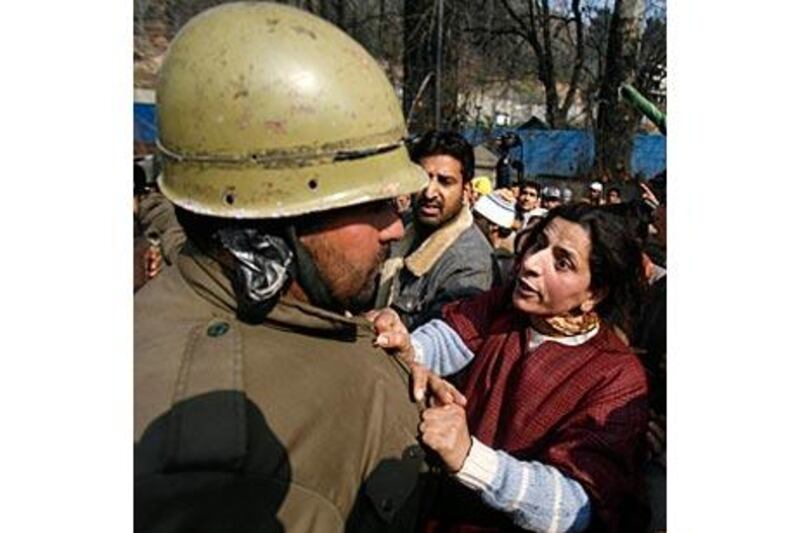SRINAGAR, INDIA // While the Indian government blamed increasing violence in disputed Kashmir on Pakistan-based militants, the disputed state's most influential separatist leader warned yesterday that New Delhi must address the concerns of Kashmiris or risk a return to all out insurgency.
Yasin Malik's comments came amid a spate of militant attacks in Kashmir in the past week, which, combined with the diplomatic limbo between India and Pakistan, further complicates US efforts to battle Islamist militancy in the region. Talks over Kashmir between India's Congress Party-led government and separatist groups broke down in 2006. While about 100,000 people have been killed since the start of the insurgency in Kashmir in 1989, the region has gradually become almost free of violence in the past few years.
Huge and mostly peaceful protests by pro-separatist Kashmiris in 2008 and 2009 fuelled hopes that New Delhi might try to reignite a peace process, but both sides made little progress amid mutual suspicion and New Delhi's fraught ties with Islamabad after the Mumbai attacks. "It has taken us so many years with a very hard effort to bring a transition from violent movement to non-violent movement. This transition needs to be respected ... If Kashmiris are not given respect they could fall back to a violent past," Mr Malik, the head of the Jammu Kashmir Liberation Front, which pushes for a peaceful campaign for Kashmiri independence, told Reuters during a conference in New Delhi.
After a year of relative calm, at least seven militants have been killed in separate gunbattles in Indian Kashmir over the past week, including one incident when militants holed up in a hotel on Lal Chowk, in the heart of Srinagar, for nearly 24 hours. "For 15 years I have been propagating non-violence but ... there are signs of frustration among both the youth and the older people, because there were huge protests and no one seemed to listen," said Mr Malik, a former militant.
But New Delhi is continuing to drag its feet over holding talks with Pakistan, which lays claim to Kashmir, saying that it must first crack down on militants behind the 2008 Mumbai attacks. India's interior minister, P Chidambaram, blamed the latest Srinagar attack on Pakistan-based militants. "These [attacks] highlight the fact that the country, especially Jammu and Kashmir state, remains vulnerable to militant attacks sponsored by forces from across the border," he said in a statement in New Delhi last Wednesday, claiming that the rebels were in communication with handlers outside the country.
The country's defence minister, AK Antony, recently claimed that a large number of fighters were waiting along the border to infiltrate into Indian Kashmir. "This is a matter of serious concern because Pakistan is not doing anything in this regard," he told reporters in southern city of Kochi on Saturday. There was no immediate reaction from Pakistan, but Islamabad has previously denied the Indian charge of turning a blind eye to the activities of militants on its soil.
Police officials in Srinagar said the latest upsurge in rebel attacks suggested that they were trying to stage a comeback. "Intercepts also reveal that they have managed to regroup here," the inspector general of police, Farooq Ahmed, said in a recent newspaper interview. According to Kuldeep Khoda, Srinigar's director general of police, the Lal Chowk attack was carried out by the Pakistan-based Lashkar-e-Taiba, even though a Kashmiri militant group claimed responsibility. He added that one of the slain militants was a Pakistani national while the other was from Indian Kashmir. Jamiat ul Mujahideen which took responsibility did not deny the Pakistani origin of the rebel but said the attack was carried out to "send a message that the armed freedom struggle is not over in Kashmir".
Many analysts see a peace process in Kashmir as key to improving India's relations with Pakistan, allowing Islamabad to divert its resources from its eastern border to focus on helping the United States battle al Qa'eda and Taliban militants. "If the Kashmir issue is addressed and a lasting political solution arrived at, such groups will fade away, at least from the soil of Kashmir," said Noor Ahmed Baba, the head of the political science department at Kashmir University.
Last year, India's prime minister, Manmohan Singh, offered to help resume talks over Pakistan and Kashmir. Little headway is visible, but some officials say a dialogue between the rivals is being carried on outside public scrutiny. "I have no reason to doubt his integrity," Mr Malik said. "But he is surrounded by military bureaucracy, he is surrounded by civil bureaucracy. Some of these people are constraining him."
foreign.desk@thenational.ae * With additional reporting by Reuters





